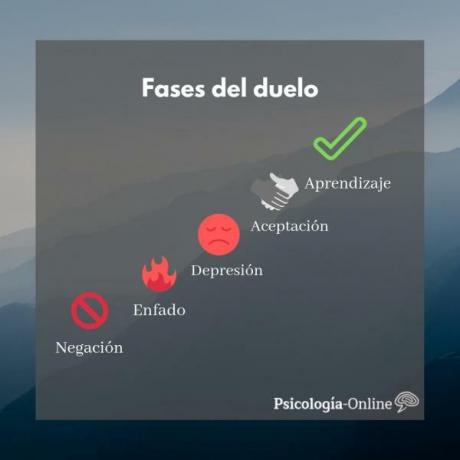
Illness and death are part of life. Human beings have a finite life and diseases exist. Denying this or looking the other way is respectable, but not helpful. Talking about illness and death helps us normalize them and learn resources to deal with both situations. Almost all of us have encountered the situation in which a friend, friend, colleague or partner loses a loved one and we do not know very well how to act or what actions can help or just the opposite. Therefore, in this Psychology-Online article you will find how to help a person who has a sick family member and what to say to someone when a family member dies.
Index
- How to encourage a person who has a sick family member
- Encouragement phrases for someone with a sick family member
- How to offer condolences to a friend
- What to say when someone dies
- How to comfort someone who has lost a loved one
- Anniversary of the death of a loved one
How to encourage a person who has a sick family member.
First of all, understanding that we are talking about a situation in which someone has a loved one in a delicate state of health, we must bear in mind that encouragement in terms of having a positive state of mind, in the vast majority of occasions, it will not be possible. Rather we should approach our performance from the how help or comfort someone who has a sick family member. What we can do is alleviate her pain.
1. Practical help
If we want to help a person who has a sick relative, we must put ourselves in their place, since it will be necessary to know their current needs. We must bear in mind that if it is the main caregiver of the sick or ill person, she may be spending a lot of time caring for her family member. On the other hand, if it is the first time that she is in this situation, it may be that she is very lost or lost. Therefore, the practical actions that we can take to help a person who has a sick family member are:
- Offer to perform tasks For those who surely do not have time: cooking, going shopping, taking care of children or any basic activity that we can do or help.
- Inform us and inform the person on bureaucratic and administrative issues that will help you to know. Depending on the characteristics and needs of the sick person, we will look for one type of information or another. For example, we can find out about resources and aid for the families of sick people, how to process the dependency law, how to request a place for a care resource... We must know what the person needs, collect information in centers, associations, pages of official organizations, etc. and provide you with the information. Next, the decision-making corresponds to the person, our role is to help.
It will also be important to promote self-care and the distribution of the burden of care so that you do not end up suffering caregiver syndrome.
2. Emotional Support
When a person has a family member going through a serious illness, they may feel sad, stressed, frustrated, powerless, overwhelmed, overwhelmed... We can help you as follows:
- Be realistic: It is very important to understand that we are not the patient's doctor and that we do not know what course the disease will follow. Therefore, it is essential not to give false hope, not to trivialize or to fall into illusory optimism. As well as not comparing with other patients or saying the typical phrase of "you'll see that he will recover soon" or "everything will be fine."
- Be there: emotional support consists of letting the person know that we understand their situation and that we offer to listen to them and to be by their side as and when they need it. Show us available, accessible and also flexible to accompany and support you.
- Normalize and validate: the person is going through a complicated situation in which he may be suffering. The best way to help him is not to let his suffering scare us so much that we want to eliminate it at all. We must normalize the discomfort in the sense that it is normal to feel anger, sadness or helplessness in such a situation. Validating his emotions, letting him know that it is normal for him to feel them, will allow him to express them and that will facilitate proper emotional management.
Encouragement phrases for someone with a sick family member.
Sometimes, with the best intention, we want to encourage the person with phrases of encouragement such as "you can handle everything", "calm down" or "this is going to be fixed". However, these kinds of claims are totally counterproductive. First, because they may not be real, and second, because we are denying the emotional state of the person and exerting pressure to be "okay." The proper way to approach the situation is to allow the person to feel what they are feeling and to express it.
What should and should not we say to someone who has a loved one hospitalized or in critical condition? Next we will see ideas and recommendations.
How to ask about a sick family member
If our objective is to know the state of the sick person, but we do not want to go directly to the subject because we do not know if our friend wants to talk On this, we can start with more generic questions and go deeper or more specific depending on the receptivity that we observe and the answers issued by him or her.
- How are you? How do you feel?
- Any news that you want to share?
- Is there something that worries you in particular?
- I can help you with something?
- What do you think would be good for you?
- How is (person's name)?
- What do the health personnel think?
- How does (person's name) feel? How do you handle it? How are you coping?
What to tell a friend who has a sick family member
Some ideas to convey our support are as follows:
- I understand how you feel.
- It is normal for you to feel this way.
- It is logical that you think this.
- You can count on me.
- I don't know how everything is going to go, but I will be by your side no matter what happens.
- If there is anything I can do to make you feel better, let me know.
- Crying is good and has nothing to do with being strong or not.
- Tomorrow I'm going to go shopping, I can bring you what you need.
- I can come to help you this afternoon, if you want.
- We will do it together.
- It is human to be wrong, nobody is perfect.
- It seems to me that you are being very brave explaining this to me.
- Thank you for sharing your emotions with me.
How to offer condolences to a friend.
The moment we find out that the relative of our friend, friend, partner or partner has passed away, we usually feel uncomfortable and do not really know how to act. It is totally normal. Death is still a subject that is rarely talked about and we generally do not know how to deal with it.
What is the correct way to offer your condolences?
To offer condolences to a loved one, we will take into account the following points:
- Keep calm: surely, the person will be overwhelmed. It will help you to transmit peace of mind.
- Act naturally: This is not the time for learned speeches or set phrases, it is better to do what comes from the heart.
- Empathize and sustain: we will try not to dramatize or let their emotions invade us too much, since the idea is to be able to help them and be supportive.
- Offer contact: many times, when someone is overwhelmed, they do not need words, but physical support: a hand on his shoulder, a hug... These gestures tend to relax us and convey presence and support.
As we can see, the best way to offer condolences is in person, since it allows us to observe the state of the mourner and adapt our behavior as the situation requires. In addition, in person we can convey the support in a much warmer and closer way. There are times when it is not possible to be in person and we must offer our condolences by phone or in writing by email or whatsapp.
How to offer condolences over the phone
With these tips it will be easier for us and comforting for him or her:
- Ask when it is okay for us to call
- Listen and respect the silence
- Capture the emotional state of the person and adapt to it
- Speak slowly and in a calm tone
A good idea if we cannot be in person is to make a video call, since seeing the person will give us more information than just the voice. In addition, although the contact will not be physical, we can use part of non-verbal communication such as a look, a smile, an expression of understanding and complicity, a kiss... gestures that will make our condolences more comforting.
How to offer condolences on whatsapp
Showing condolences on whatsapp is not very close. However, sometimes it is the only possible way. It has the advantage that it is less invasive and may be the appropriate way if the person is reserved or we do not have a bond of trust. In addition, it is currently and increasingly being a widely used means of communication, so we can use it to express our condolences.
It will be closer and more personal to send a voice message than a written message. But we will adapt according to the bond and the trust that there is with the person.
It will not be appropriate to send a very long text message or use the typical counterproductive phrases. Next we will see what phrases to say and what things to save when we offer our condolences.
What to say when someone dies.
After knowing the news, the best thing is to say what comes out naturally and sincerely. If it's "I'm sorry", that's enough. Some ideas are:
- I share your sentiment.
- I am so sorry for the loss.
- It is natural for you to feel this.
- You have the right to feel that way.
- I am by your side.
- I hear you.
- I know how much you loved him.
- It has been a person (adjective).
- Everything lived will always remain.
- It will remain in our hearts and our thoughts.
- Can I help you with any management?
- Do you need someone to take care of the children?
- Do you have transportation to go to (place where the wake is held)?
The typical phrase "if you need something, let me know" is an offer made with the best intention, but it is formulated in such a generic way that it is of little use. It leaves the responsibility to the person, who does not know what we are willing to do and what not. Therefore, if we really want to help, we must be specific and offer to do some task that we can foresee that will require support.
Things we should not say when someone passes away
We can save certain phrases that do not help, such as:
- Well, he was already very old.
- It's better that way.
- He has stopped suffering.
- Life is so.
- It is the law of life.
- Things that happen.
- You are young, you can rebuild your life.
- You are young, you can have another child.
- You will get over it, you are strong.
- I couldn't go visit him because I don't like hospitals.
- You will meet again in heaven.
This is not the time to look for positive things, or to rationalize. Faced with a significant loss the person has the right to feel badRegardless of the deceased person's age, regardless of their status. On the other hand, one thing is to normalize death as part of life and the other is to minimize and trivialize the suffering that a person has after the loss. We all know that life is over, but when it touches us closely we feel a pain that needs to be respected. It doesn't hurt less to know that "life is like that."
In cases where the deceased is the spouse or a child, it is not appropriate to suggest that they may have another partner or another child. It should be mentioned that nobody likes hospitals, that diseases are unpleasant experiences for everyone. However, we must take stock and, if we think it is important to visit someone who is in the hospital, we must go.
On the other hand, we must be careful and respect the beliefs of each person as for death. If you are not a religious person, phrases in that sense will not help you ("now you are in a better place", "you have gone with God" ...). Another comment totally out of place in these cases is to talk about the causes or forms of death, whether or not the deceased person smoked, ask how it was in case it was a suicide, etc. In addition to these phrases, any comment or attitude aimed at minimizing pain or looking for the positive side should be avoided, as this is not the time for it.

How to comfort someone who has lost a loved one.
How to help someone when a relative has passed away? It will depend on the person and the situation, but broadly speaking, to comfort someone who has just suffered a loss we can:
- Stand by him: with our presence she will feel accompanied or accompanied.
- Listen carefully: practice the active listening It is essential so that our friend knows that he is important to us and that if he needs to speak, we will be there to listen to him.
- Respect their silence: it is not necessary to continually fill the space with words, which are often absurd. It is as necessary to listen to him when he wants to speak, as to accompany him in silence when he is silent.
- Validate your emotions: we must convey to her that what she feels is normal. We should never tell him not to feel something, such as "don't be sad", or what to do: "don't cry", "cheer up" ...
- Make it easy for you to express your emotions: we will be helping you to show your emotional state if we maintain an open, close attitude and, above all, without judgments.
- Keep serenity: it is normal that when the person is overwhelmed, the emotion of it infects us. We can accompany you in the emotion but maintaining the serenity to transmit calm and comfort.
- Use contact: hug, hold her hand, squeeze her shoulder... These gestures are usually very comforting, supportive, and calm.
- Show our love: let the person know how important and valuable they are to us. Demonstrate our appreciation and affection with actions.
- Offer practical help: help with household chores (shopping, cleaning, cooking ...), caring for people in your care such as sons and daughters and administrative tasks or bureaucracy, paperwork, etc. We should not wait for the person to ask us for help, when we see that there is a necessary task, we can offer to do it and do it.
- Offer support to family members and loved ones of our friend. Perhaps our friend is not in the mood to act as support for other people, so we can help you by offering this support to whoever needs it.
In addition, we can also recommend and encourage you to go to a professional of psychology, who will teach you techniques and resources to analyze your thoughts, regulate your emotions and adapt your behaviors to end the duel. Tools that will serve you both to manage the loss situation and future adverse situations.
On the other hand, it is worth mentioning that we will be helping the person if we encourage them to maintain some Healthy habits and self-care guidelines (diet, physical activity and rest).
Phrases to encourage someone who lost a loved one
What we can say to someone who has suffered the loss of a family member is:
- It is normal for you to feel bad.
- I'll be by your side.
- You can count on me.
- Cry calm, if you need to cry, do it.
- If you need to vent, you can scream or throw a pillow.
- (name of deceased person) would be proud of (behavior or attitude of the bereaved).
- You are very important to me.
- I don't need to always look good, I understand your discomfort.
- I understand that you do not feel like doing (whatever plan). We postpone it without problem.
- I'm going for a walk, would you like to come?
- Thank you for trusting me and telling me about your feelings.
Anniversary of the death of a loved one.
We must be very clear that after a loss comes a duel. Grief is a period of adaptation that the debtor needs to assimilate the loss, passing through a series of states. We must bear in mind that the typical known phases of mourning do not have to be all or always in order, since every duel is different. It will depend on the characteristics of the relationship between the bereaved and the deceased, the circumstances of death and the resources for coping with the debtor.
The mourning does not have a set time, but it is normal for it to last at least a year. And it is something important to keep in mind. Often people are supported for the first few days or weeks after death and then everything returns to normal: we forget about grief. It is important to respect the times of each person, not to compare one duel with another and continue accompanying beyond the first days. How can we accompany a duel?
- Being present.
- Detecting the needs.
- Letting you know that we are available to help, listen, talk, ...
- Giving it the importance it needs.
- Respecting: without forcing.
Here you will find more information about grieving processes in the event of significant losses.
How to act on the dates indicated
On special days, such as birthday, date of death, saint, father's day, mother's day, etc., it is It is important that we are especially attentive and attentive, since these are moments in which the feelings of loss are intensify. Maybe memories are more present and emotions invade you. To address it, we will continue accompanying in the manner explained, but, in addition, we can propose to pay tribute to the deceased.
On designated dates we can perform a special act in honor of the deceased person. Depending on the person, one act or another will be significant. From visiting the cemetery (a traditional custom), to symbolic acts such as writing a letter, having a family reunion or looking at photographs and walking through the memories.
Beautiful phrases for a deceased loved one
If you are looking for phrases of mourning or mourning for the death of a being, I want them to reflect your state of mind, below you will find some phrases to remember a deceased loved one short:
- All the things he has taught us will remain with us.
- The experiences lived together will remain forever in our memory.
- Your smile remains in our heart.
- Your love will be eternal.
- Our love for you will never die.
- What you have instilled in us makes us who we are. There will always be a large part of you in us.

This article is merely informative, in Psychology-Online we do not have the power to make a diagnosis or recommend a treatment. We invite you to go to a psychologist to treat your particular case.
If you want to read more articles similar to How to offer condolences: tips and phrases, we recommend that you enter our category of Emotions.
Bibliography
- Fernández Pérez, L., Isidro Carretero, V., Pérez Muñano, C., Sánchez-Valladares Jaramillo, V. and Balbás Repila. (2011). Practical guide for relatives of Alzheimer's patients. Alzheimer Center Reina Sofía-Clece Social Services Foundation.
- Llistar Verdú, S. (2009). Assistance in the process of dying: importance of attitudes for a dignified death (Doctoral dissertation, Ramon Llull University).


